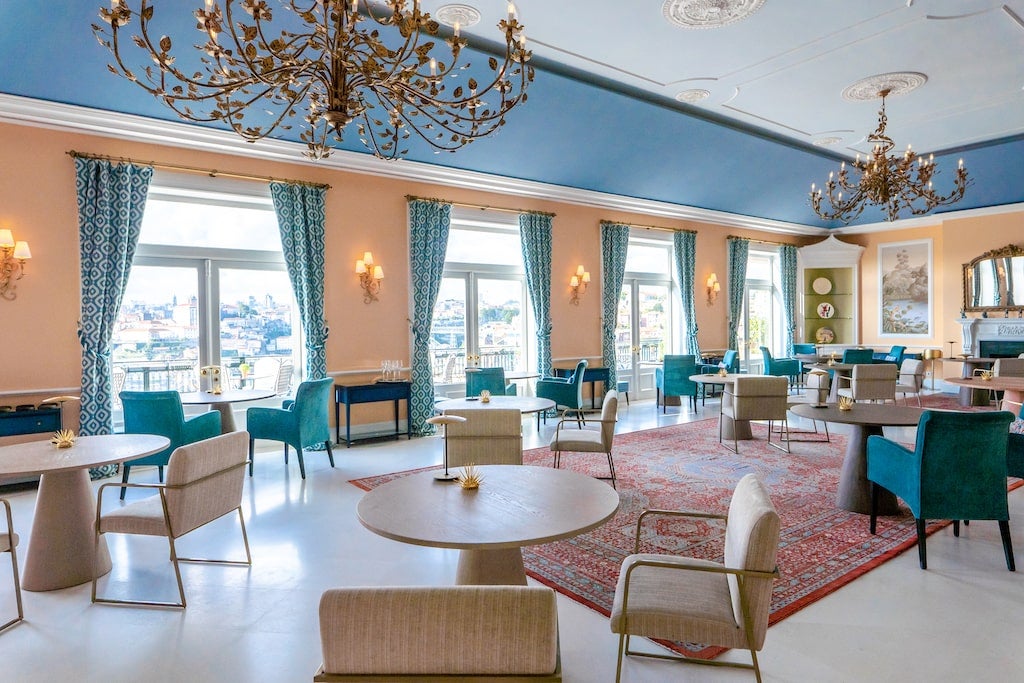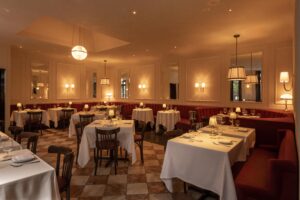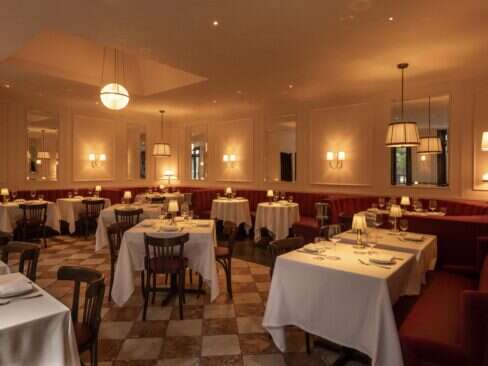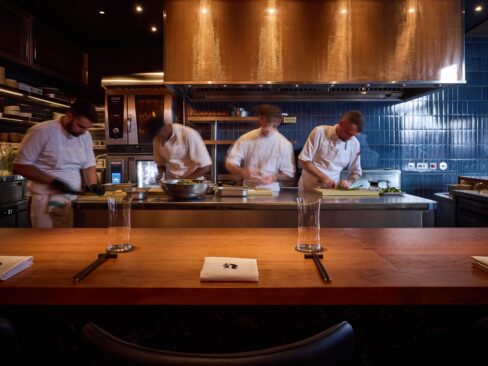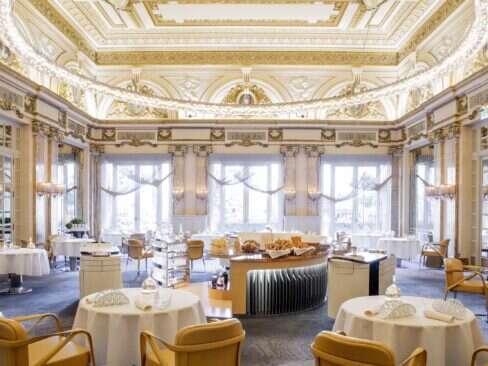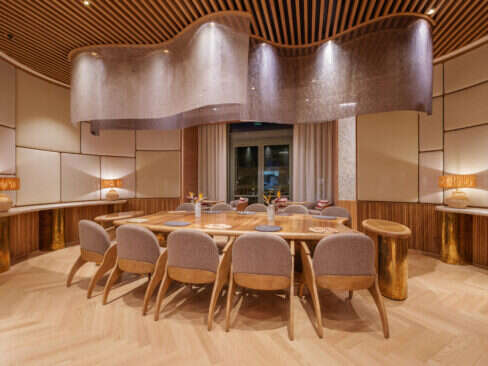Portugal’s second city, Porto, straddling the steep-sided river Douro, as it readies to empty itself into the Atlantic, has a well-documented rivalry with the capital Lisbon. While Lisbon lapped up the attention, Porto’s manifold low-key charms lay unperturbed for decades.
With its captivating colorful historic center now Unesco-listed, however, and a burgeoning reputation as one of Southern Europe’s most alluring city-breaks, the capital of the North saunters into the 21st century with a self-assurance one step away from a swagger.
A major development that will undoubtedly have contributed to this renaissance, lies in Vila Nova de Gaia, on the opposite bank of the Douro to the city center. There, the predominantly Anglo-Portuguese family dynasties who’ve controlled the port wine industry since the 16th century, preside over their own personal fiefdom.
In 2010, Adrian Bridge, who heads up Taylor’s, one of the oldest and most prestigious of the brands, unveiled The Yeatman to great acclaim. Situated on top of the hill looking down across the red-roofed maze of wine warehouses known as port lodges, The Yeatman, the principal family name behind Taylor’s (Mr Taylor’s input was fairly short-lived), was suddenly profiting day and night, from newfound and utterly mesmerizing views of the city skyline across the river.
[See also: Atrio: Wine Heist Restaurant Thrives with Third Michelin Star]
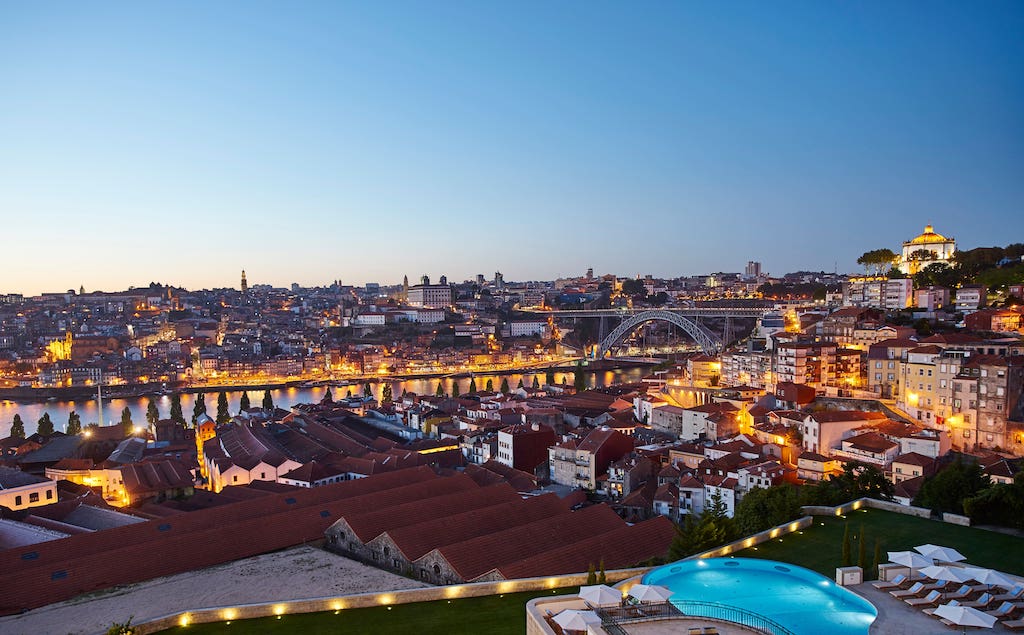
In the same year, The Yeatman’s gastronomic restaurant was inaugurated, and Ricardo Costa installed as executive chef, a position he continues to hold. After just one year under Costa’s gastronomic guidance, in 2011, The Yeatman was awarded Porto’s first Michelin star, with a second arriving in 2017.
The Yeatman has retained its prestigious two-star status ever since, an accolade it currently shares with just six other restaurants in Portugal. There are currently no three-starred establishments in the country.
[See also: The Best Wine Hotels in The World]
The restaurant remains at the heart of The Yeatman’s overall projection as the region’s go-to dining destination, burnished by the vinicultural credentials of the Taylor’s brand. Each of the 109 rooms in the Relais & Chateaux property is associated with a particular wine partner, invariably one of the quintas or herdades (vineyards), whilst the wine list is predictably exhaustive.
Even the swimming pool is shaped like a giant wine decanter. Bridge’s latest venture, WOW, the World Of Wine, cascading down towards the river below The Yeatman, was unveiled in 2020 and is one of the largest such developments in Europe, aimed at professionals and amateurs alike.
The chef
In November, at the Spain and Portugal Michelin Guide ceremony in Toledo, just outside Madrid, it was announced that as of next year, Portugal will have its own guidebook and its own awards ceremony. In a reflection, perhaps, of the two countries’ sensitive symbiotic journey across the centuries, the smaller state couldn’t contain its joy.
As if donning his armor for a guest appearance in an episode of Game of Thrones, much of which was filmed in the Iberian Peninsula, the president of Turismo de Portugal, Luís Araújo, spoke in terms of a “conquest”.
For Costa, who was also in Toledo presenting awards to Portugal’s newly anointed one-star restaurants, it was no less a moment of national pride. His perspective that Portugal has a distinct and vibrant national cuisine that isn’t held in quite the esteem it could or should be, is a view that he’s known to articulate.
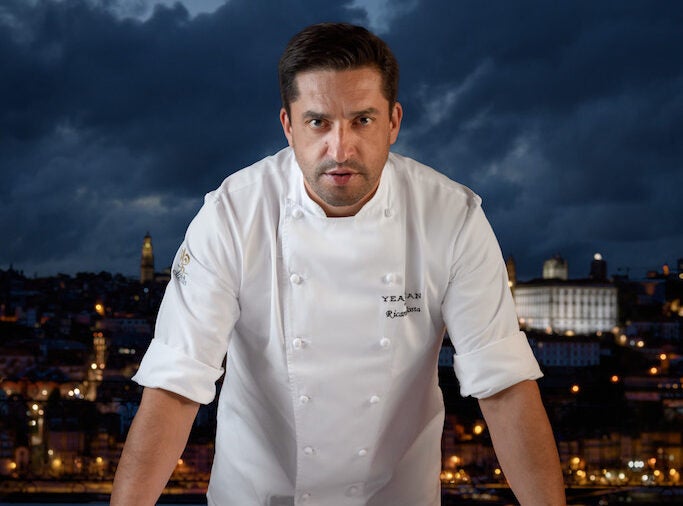
As one of the three current judges of Portuguese MasterChef, his epicurean profile across the country is well-established.
Born in Aveiro, on the Atlantic coast, 50 miles south of Porto, his upbringing was steeped in the culinary traditions, the artisanal produce, and the ultra-fresh Atlantic seafood which lies at the heart of much of Portuguese cooking.
These imprints of an unrefined yet uniquely derived Portuguese gastronomy are what he’s carried with him on his journey toward the crafting of a supremely sophisticated haute cuisine.
The youngest Portuguese recipient of a Michelin star, whilst at his previous position before moving to The Yeatman, Costa remains not only a leading exponent of, but an enthusiastic proselytizer for, the Portuguese culinary arts.
The menu
The tasting menu, as tasting menus are contrived to be, is a non-stop showcase of Costa’s extremely impressive skillset, though at 14 courses, is mercifully shorter than many such demonstrations of gastronomic dexterity.
It begins in the bar area of The Yeatman, around the corner from the restaurant’s entrance which is presided over like the outside of an exclusive nightclub. That, of course, only serves to exacerbate the urge to get in there and see what’s going on.
The first of several amuse-bouches arrives; a nori algae tart with a slither of sea bass marinated in salt, with kimchi, ginger and peppers, finished with tapioca pearls, ginger gel, and cucumber sprouts, at which point, any speculation as to what kind of treat the tastebuds are in for, is crystallized.
The meal ahead is clearly going to be as intricate in its presentation as it is sophisticated in its conception. The amuse-bouches also intimate at an affinity with another great seafood-based cuisine – Japanese.
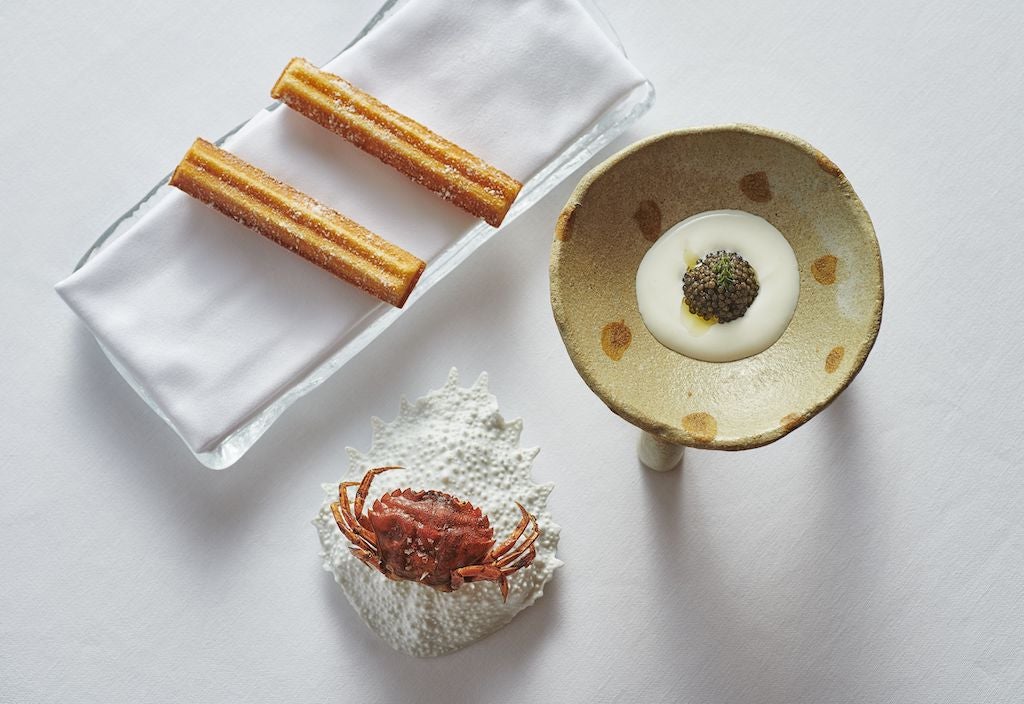
Having made it inside the holy of holies, guests are almost immediately prised away from their tables to be systematically ushered into the kitchen where there’s a chef’s table, though without seating. A member of the brigade is waiting with several more morsels of gastronomic gratification, beginning with smoked eel served on a spoon, with slivers of kobe beef, crispy soya and egg caviar.
The trip into the kitchen is, though, an elegantly conceived diversion, providing a welcome counterbalance to the hushed formality of the dining room.
The first dish at the table, a chawanmushi, confirms the Japanese influence. The famous savory Japanese egg custard, served here with pink prawns, soya caviar, shimeji mushrooms and finished with dashi stock proved outstanding.
All of the paired wines, meticulously selected by The Yeatman’s wine director, Elisabete Fernandes, are Portuguese, many of them sourced from exclusive labels and older vintages. For the chawanmushi, a Mapa Vinha dos Pais 2017 from the Douro Valley was served, part of a 1,000-bottle limited release.
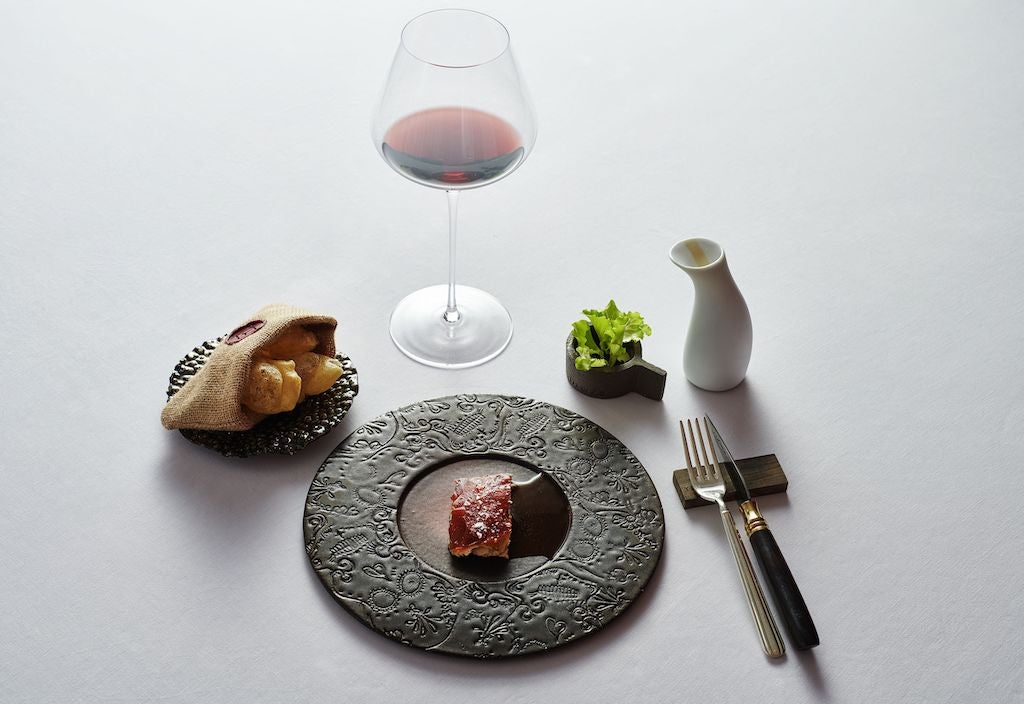
It would, in fact, be difficult to conceive of a better environment within which to further one’s appreciation of Portuguese wines than The Yeatman, now with the Wine School an integral part of WOW, and fulfilling precisely that purpose.
Back in my own preferred seat of learning, the tasting menu continued to unfold in the same superlative way in which it began, with a complex and highly accomplished demonstration of a contemporary culinary artist at work.
The pronounced tilt toward seafood from a chef keen to promote Portuguese, as well as Japanese cuisine, doesn’t, however, preclude the inclusion of signature dishes like suckling pig, with its closely guarded secret recipe.
Costa’s complete mastery of his craft disports an ability to essentially coax achingly good flavors and aromas out of pretty much anywhere.
Interiors
Having negotiated that closely guarded entrance to the inner sanctum of epicurean delights, the wandering gastronome, perhaps anticipating an intimate, subtly lit jazz bar atmosphere, eventually wanders into a large bright room, finished in pastel shades, where the tables are very liberally spaced out.
The restaurant decor and design template is the same as elsewhere in The Yeatman, which whilst undoubtedly cossetting, is also, in essence, quite conservative. That’s gratifying to many tastes, indeed, a great many, judging by the highly successful trajectory of the hotel since its inception, not to mention its lauded, two-starred restaurant.
Those in search of a more stimulating style statement as the backdrop to their gastronomic indulgences, however, have no need to look elsewhere. They just need to look out the window.
The principal component of The Yeatman’s design construct is arguably the city of Porto itself. In other words, The Yeatman is all about the absolutely magnificent views across the river. Painstakingly cobbled together over centuries, this picture-perfect urban panorama is without doubt, among the finest vistas available anywhere in Southern Europe.
Ghosting through the slow-moving foggy mornings of winter, or spectacularly splayed out amidst the sun-spattered splendor of sultry summer evenings, The Yeatman’s numerous terraces take full advantage of this hypnotic non-stop performance.
Not least, from the terrace of The Yeatman’s gastronomic restaurant. That unassailable outlook, conjoined with Ricardo Costa’s exceptional cuisine makes for a meal of truly memorable dimensions. Eat your heart out Lisbon.
the-yeatman-hotel.com





